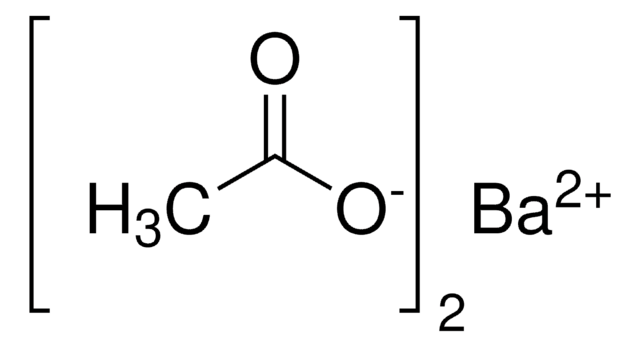All Photos(1)
About This Item
Empirical Formula (Hill Notation):
H2
CAS Number:
Molecular Weight:
2.02
EC Number:
MDL number:
UNSPSC Code:
12142100
PubChem Substance ID:
NACRES:
NA.22
Recommended Products
vapor density
0.07 (21 °C, vs air)
Quality Level
Assay
≥99.99%
autoignition temp.
1060 °F
expl. lim.
74.2 %
impurities
≤10 ppm oxygen
≤5 ppm water
bp
−252.8 °C (lit.)
mp
−259.2 °C (lit.)
SMILES string
[H]
InChI
1S/H2/h1H
InChI key
UFHFLCQGNIYNRP-UHFFFAOYSA-N
Looking for similar products? Visit Product Comparison Guide
General description
Hydrogen(H2) is colorless, odorless, tasteless, non-toxic, and highly flammable diatomic gas.
Application
H2 can be used:
- To reduce metal oxide to metal.
- In the catalytic hydrogenation of nitro compounds, ketones, and olefinic compounds.
Packaging
Supplied in a carbon steel lecture bottle with a CGA180M/CGA110F needle valve installed.
Compatible with the following:
Compatible with the following:
- Aldrich® lecture-bottle station systems
- Aldrich® lecture-bottle gas regulators
Other Notes
See Technical Information Bulletin AL-151 Gas Regulators: Selection, Installation, and Operation
Legal Information
Aldrich is a registered trademark of Sigma-Aldrich Co. LLC
also commonly purchased with this product
Product No.
Description
Pricing
control valve
hose barb
Product No.
Description
Pricing
purge valve
Product No.
Description
Pricing
recommended
Product No.
Description
Pricing
Signal Word
Danger
Hazard Statements
Precautionary Statements
Hazard Classifications
Flam. Gas 1A - Press. Gas Compr. Gas
Storage Class Code
2A - Gases
WGK
nwg
Flash Point(F)
<-238.0 °F - closed cup
Flash Point(C)
< -150 °C - closed cup
Personal Protective Equipment
dust mask type N95 (US), Eyeshields, Gloves
Choose from one of the most recent versions:
Already Own This Product?
Find documentation for the products that you have recently purchased in the Document Library.
Effects of reduction temperature and metal- support interactions on the catalytic activity of Pt/γ-Al2O3 and Pt/TiO2 for the oxidation of CO in the presence and absence of H2
Alexeev OS, et al.
The Journal of Physical Chemistry B, 109(49), 23430-23443 (2005)
Kinetics of reduction of iron oxides by H2: Part I: Low temperature reduction of hematite
Pineau A, et al.
Thermochimica Acta, 447(1), 89-100 (2006)
Catalytic reductive transformations of carboxylic and carbonic acid derivatives using molecular hydrogen
Dub, Pavel A and Ikariya, Takao
ACS Catalysis, 2(8), 1718-1741 (2012)
Gold catalysts open a new general chemoselective route to synthesize oximes by hydrogenation of α, β,-unsaturated nitrocompounds with H2
Corma A, et al.
Journal of the American Chemical Society, 129(20), 6358-6359 (2007)
Metal-free catalytic olefin hydrogenation: low-temperature H2 activation by frustrated Lewis pairs
Greb L, et al.
Angewandte Chemie (International ed. in English), 51(40), 10164-10168 (2012)
Protocols
Separation of Hydrogen; Oxygen; Nitrogen; Carbon monoxide; Methane; Carbon dioxide; Acetylene; Ethylene; Ethane
Our team of scientists has experience in all areas of research including Life Science, Material Science, Chemical Synthesis, Chromatography, Analytical and many others.
Contact Technical Service









